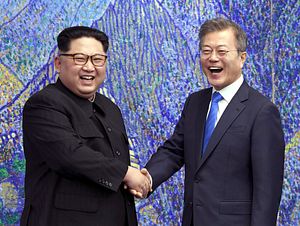As South Korean President Moon Jae-in continues his push to declare an official end to hostilities with North Korea, many are wondering: What will happen to Korean prospects for reunification? Some have already identified the fact that an official peace might make reunification more difficult since North Korea’s standing as an independent country would be legitimized. In many ways, Moon’s efforts appear to be a deliberate attempt to achieve this outcome.
Before overreacting and labeling Moon a naïve North Korean sympathizer, let us consider the reasons why South Korea might want to enhance the standing of its northern enemy. Remember, South Korea is a nation with mandatory conscription to defend against the North. North Korea, on the other hand, is a country whose official stance has been to view the South as a puppet of the United States, in need of liberation from capitalist tyranny. They are not exactly best buddies at the bar. Nevertheless, there are some good reasons why Seoul might want to let Pyongyang adopt the status of an independent country, unfettered by wartime sanctions.
The first and most important reason has to do with the simple fact that Korean reunification is already unviable. Even if Kim Jong Un decided to retire today, defect to the South, and hand over his entire country wholesale and peacefully, the process of reunification would be impossible to undertake. The technological and economic differences between the two countries are simply too great. Reunification would result in a deluge of new residents to the South, accompanied by an overwhelming financial burden to provide healthcare, employment, education, social services, and infrastructure. The costs would simply be prohibitive.
To illustrate how economically impracticable the situation is, let’s compare the current Korean situation to post-Cold War German reunification. In 1991, East Germany had a per capita GDP valued at $11,000 using today’s currency. This was roughly half the average of West Germany. East Germany also had about twice the unemployment at 11 percent. Household assets were significantly lower, with average East German households holding less than 30 percent the value of West counterparts.
Despite a very organized and carefully implemented economic plan to reduce regional differences executed over the course of a quarter century, the per capita GDP of former East German provinces still stands today at less than 70 percent of former West provinces. Unemployment in the former East hovers around twice that of the West, at 11 percent, and average household assets still haven’t risen to 50 percent of the West. In short, equalizing economic conditions post-unification is incredibly difficult, with efforts in Germany still ongoing today.
Current conditions for the Korean Peninsula are much worse. North Korean per capita GDP, valued at around $1,800, is about 7 percent of South Korea’s $26,000. Unemployment numbers for North Korea are hard to come by, but we do know most of the wealth and assets are centrally controlled, raising the additional question of how these would be dealt with in any reunification scenario. No one denies North Korea has a lot of future economic potential, but there is a long way to go before it gets anywhere near the South.
In a roundabout way, a peace deal with Seoul would give North Korea the chance to become self-sustaining and begin the long process of catching up economically. It appears the Moon administration is viewing this as the only way to revive the viability of reunification, by delaying it to a distant future. An official end to hostilities would call into question the validity of economic sanctions imposed by the United States, giving Pyongyang the chance to trade and develop its economy. Although the lifting of sanctions would no doubt legitimize and preserve Kim Jong Un’s oppressive regime, it would also likely save a lot of lives by lifting the country out of poverty. Depending on your priorities, one might also hold the belief that economic liberalization will inevitably lead to democratization, albeit in a distant future.
An end to hostilities would benefit the South too, allowing it to devote more of its resources to economic and societal development. The resources I speak of include both money and manpower. As mentioned above, South Korea has mandatory military service for men. Not only is this a serious financial commitment for the government, it is a constant drain on youth potential, interrupting college educations and reducing the overall productivity of young citizens. Although a peace declaration in the near future is unlikely to result in any significant change in South Korean military practices for decades, the eventual savings in finance and productivity would be significant, likely helping alleviate the economic stress imposed by South Korea’s aging population.
In summary, an official peace declaration will extinguish any hope of reunification in my lifetime but may preserve embers for future generations to revisit.
Justin Fendos is a professor at Dongseo University in South Korea and the associate director of the Tan School at Fudan University in Shanghai.

































